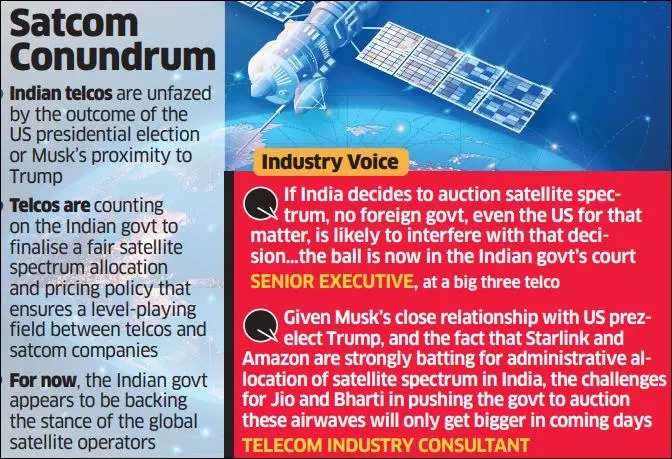
Kolkata: Elon Musk 's Starlink and Amazon Kuiper may get more leverage for their planned satellite internet operations in India with the return of Donald Trump as the US President, experts said. Trump is well known for his proximity to Musk. Some of the experts said India's top telcos Reliance Jio and Bharti Airtel may now find it increasingly difficult to coax the Indian government to change its position of allocating satcom airwaves without auctions, a stance backed by Starlink and Jeff Bezos-owned Amazon.
A day after Trump's win, communications minister Jyotiraditya Scindia too reiterated that satellite airwaves will not be auctioned but allocated administratively, though, at a cost to be decided by the telecom regulator. Advt "Given American tech billionaire Musk's close relationship with US president-elect Trump, and the fact that both Starlink and Amazon are strongly batting for administrative allocation of satellite spectrum in India, the challenges for Jio and Bharti in pushing the government to auction these airwaves will only get bigger in coming days," a top telecom industry consultant told ET. More so, since policy makers in India too are inclined towards administrative allocation of satellite spectrum as is the global trend, the executive said.
A fierce battle is currently underway between Jio and Airtel - and global satellite firms - Starlink and Amazon - over the allocation mode of satellite spectrum and its pricing to support broadband-from-space services. Making a case for equal treatment of telecom and satcom services, India's biggest telcos have told the Telecom Regulatory Authority of India (Trai) that only auctioned satellite spectrum must be used to service urban or 'retail' consumers as they believe Starlink, Amazon and other global satellite operators plan to offer satellite broadband services in urban areas and directly compete with local telcos. Starlink, in a recent submission to Trai, has called the telcos' demand "self-serving, at the cost of underserved users".
Global satellite operators have rejected the telcos' call for auctioning satellite spectrum, calling it a misleading approach. They have held that since satcom airwaves are a shared resource, they cannot be auctioned. The likes of Starlink and Amazon plan to use their low-earth orbit (LEO) global satellite constellations to launch broadband-from-space services in India.
Advt The telcos, though, are unfazed by the outcome of the US presidential election or Musk's proximity to Trump. They are counting on the Indian government to finalise a fair satellite spectrum allocation and pricing policy that ensures a level-playing field between telcos and satcom companies. "No matter who comes to the (US) White House, if India decides to auction satellite spectrum, no foreign government, even the US for that matter, is likely to interfere with that decision.
..the ball is now in the Indian government's court," said a senior executive at a Big 3 telco.
However, for now, the Indian government appears to be backing the stance of the global satellite operators. Minister Scindia on Wednesday reportedly said that not a single country auctions spectrum for satellite services, and every country (including India) has to follow the International Telecommunications Union (ITU), which lays out the policy on assignment of satellite spectrum. This, since India is a member of the ITU, the UN's specialised global agency for information & communication technologies (ICT) and spectrum management.
Satellite broadband services are yet to start in India as the government has not yet finalised the rules on pricing and method of spectrum allocation. That can happen only after Trai issues its recommendations on these matters. Currently, only Bharti Group-backed Eutelsat OneWeb and a Jio-SES combine have the statutory clearances and permits to start satcom services in India.
Applications of Starlink and Amazon Kuiper among others are pending with Indian authorities. US-based Globalstar too is keen to expand its satellite broadband services to India. India's space sector regulator, IN-SPACe estimates that the country's space economy has the potential to hit $44 billion by 2033, and account for about 8% of the global share from around 2% now.
By Kalyan Parbat , ET Bureau Published On Nov 8, 2024 at 07:56 AM IST Telegram Facebook Copy Link Be the first one to comment. Comment Now COMMENTS Comment Now Read Comment (1) All Comments By commenting, you agree to the Prohibited Content Policy Post By commenting, you agree to the Prohibited Content Policy Post Find this Comment Offensive? Choose your reason below and click on the submit button. This will alert our moderators to take actions REASONS FOR REPORTING Foul Language Defamatory Inciting hatred against a certain community Out of Context / Spam Others Report Join the community of 2M+ industry professionals Subscribe to our newsletter to get latest insights & analysis.
Download ETTelecom App Get Realtime updates Save your favourite articles Scan to download App Starlink internet Satellite internet in India Starlink India Amazon Kuiper Elon Musk Donald Trump Reliance Jio vs Starlink India telecom spectrum allocation Satcom Industry.














